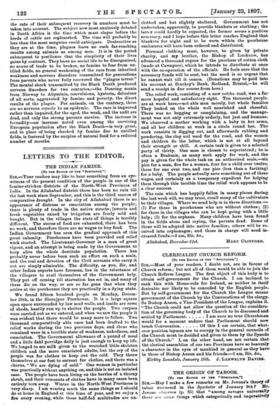LETTERS TO THE EDITOR.
THE INDIAN FAMINE.
pro THZ EDITOR OF THE mSPECTATOR.")
Sin,—Your readers may like to hear something from an eye- witness of the present condition of the people in one of the famine-stricken districts of the North-West Provinces of India. In the Allahabad district there has been no rain till the last week since September, and this is the third season of comparative drought. In the city of Allahabad there is no appearance of distress or emaciation among the people; there is plenty of trade in the native streets; [sweets and fresh vegetables raised by irrigation are freely sold and bought. But in the villages the state of things is terribly different. The stores of food are exhausted, there has been no work, and therefore there are no wages to buy food. The Indian Government has seen the gradual approach of this great calamity. Poorhouses have been provided and relief work started. The Lieutenant-Governor is a man of great vigour, and an attempt is being made by the Government to keep alive the whole destitute population. There has probably never before been such an effort on such a scale, and the zeal and devotion of the Civil servants who carry it out are simply admirable. The difficulty, as you, Sir, and other Indian experts have foreseen, lies in the reluctance of the villagers to avail themselves of the Government help. They put off coming till starvation has set in, and many of them die on the way, or are so far gone that when they arrive at the poorhouses they are practically in a dying state.
We found fifteen hundred people on Monday, Decem- ber 28th, in the Siurajpur Poorhouse. It is a large square open space surrounded by low mud walls, and inside are rows of sheds, hastily run up to shelter the people. Two corpses were carried out as we entered, and when we saw the people it was evident that there would be many more to follow. Two thousand comparatively able ones had been drafted to the relief works during the two previous days, and those who remained were in a terrible state of weakness, nakedness, and emaciation. The Government allowance of a pound of meal and a little dahl porridge daily is just enough to keep up life. We longed to see milk given to the wretched little skeleton children and the more emaciated adults, but the cry of the people was for clothes to keep out the cold. They threw themselves at our feet to entreat for clothes, and there was a chorus, "We are dying of cold." One woman in particular was practically without anything on, and this is not an isolated case. The people have been living on the berries of a thorny shrub, and their remnants of clothes have in many cases been entirely torn away. Winter in the North-West Provinces is very sharp. I am wearing much the same things as I should do at home in England at this time of year, and we enjoy a fire every evening, while these half-fed multitudes are un-
clothed and but slightly sheltered. Government has not undertaken, apparently, to provide blankets or clothing; the latti r could hardly be expected, the former seems a positive necessary, and I hope before this letter reaches England that blankets for night and to be worn within the poorhouse enclosures will have been ordered and distributed.
Personal clothing must, however, be given by Private charity, and my brother, the Bishop of Lucknow, has advanced a thousand rupees for the purchase of cotton cloth (made at Cava:pore), which he intends to distribute at once with the co-operation of the officials. He feels sure that the necessary funds will be sent, but the need is so urgent that he cannot wait till it comes. (Donations may be paid into- his account at Stuckey's Bank, Redland, Bristol,—he will send a receipt in due course from here.) The relief work, consisting of a new eutcha road, was a far more hopeful and satisfactory sight. Ten thousand people. are at work here,—not able men merely, but whole families They looked on the whole well nourished and cheerful. There was no begging or complaining, and the manage- ment was not only extremely orderly, but just and humane. We observed a mother working with a baby in her arms, and all her children at work in a circle round her. The work consists in digging out, and afterwards rubbing and- powdering, the clay soil used for the road, and the women- and children .do the latter, which is not at all beyond their strength or skill. A certain task is given to a selected party of thirty. One man is chosen to superintend ; he is often a Brahmin, as many such apply for work, and the pay is given for the whole task on an authorised scale,—sin pice for a man, five for a woman, four for a child over twelve, three for one over two, and one pice (less than a farthing) for a baby. The people actually save something out of these wages, and certainly as a temporary expedient for helping them through this terrible time the relief work appears to be a clear success.
The rain which has happily fallen in many places during the last week will, we may trust, recall many of the cultivators to their villages. Where we send help is in three directions :- (1) For those in poorhouses who are without clothes ; (2), for those in the villages who can be kept going with a little- help ; (3) for the orphans. Many children have been found, in the fields alone and crying, the parents dead. Some of these will be adopted into native families; others will be re- ceived into orphanages ; and those in charge will need in- creased funds.—I am, Sir, Sic.,


































 Previous page
Previous page